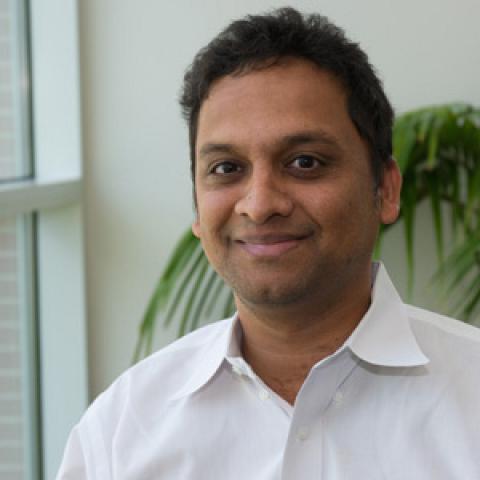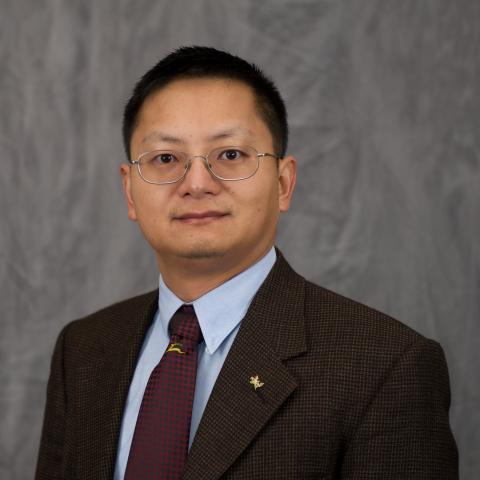event
IDEaS Short Talks and Social: Xiaoming Huo and Sudheer Chava
Primary tabs
The Institute for Data Engineering and Science hosts a series of short talks to learn about research across the Georgia Tech campus. The presentations are from broadly different topics and accessible to those in other research areas. Come chat with colleagues and learn more about what’s new in data science!
Sudheer Chava
Alton M. Costley Chair and Professor of Finance
Scheller College of Business
“Big Data, Analytics, and Machine Learning in Finance”
TSRB Auditorium
2:00–2:30 p.m.
Abstract: Financial markets and trading have changed dramatically over the past few years with the advent of algorithmic and high-frequency trading. Billions of stocks, bonds, derivatives, and other financial securities are bought and sold in the financial markets every day with some of the securities held only for a few milliseconds. Apart from trading, the explosion in the availability of structured and unstructured data has opened up many applications for data analytics and machine learning in the finance domain.
These applications include the development of trading strategies, FinTech, fraud detection, compliance, credit risk, risk management, and RegTech, as well as analyzing and understanding social media and speech of executives. In addition, applying ML models in finance raises a number of interesting questions about fairness, ethics, and financial inclusion. Apart from prediction, establishing causality and explainable ML are of major interest in finance. In this talk, I will give an overview of my recent research in these areas and discuss some resources and collaboration possibilities at Georgia Tech.
Bio: Sudheer Chava is the Alton M. Costley Chair and professor of finance in the Scheller College of Business at Georgia Tech. He serves as the Finance area coordinator at Scheller, the director of the Masters in Quantitative and Computational Finance (MS-QCF) program (a joint program between the schools of Mathematics and Industrial and Systems Engineering and Scheller College of Business), and as associate director for Risk Management at the Institute for Information Security and Privacy at Georgia Tech. He also directs the FinTech Lab.
Chava studied computer science engineering as an undergraduate student, then received an MBA from the Indian Institute of Management (IIM-B) and a Ph.D. in Finance from Cornell. His expertise is in banking, FinTech, credit risk, risk management, household investment, consumption, debt, retirement and savings behavior, and applications of ML models in finance. He has published extensively in all the top journals in finance on these and related topics. Many of his papers have won, been a finalist for, or have been nominated for best paper and other research awards. Chava has consulted for many major financial institutions and a major credit rating agency. He teaches in executive education programs on FinTech and also advises some FinTech startups.
Xiaoming Huo
A. Russell Chandler III Professor
Stewart School of Industrial & Systems Engineering
“Interface of Statistics, Computing, and Data Science”
TSRB Auditorium
2:30–3:00 p.m.
Abstract: Inference (aka predictive modeling) is at the core of many data science problems. Traditional approaches could be either statistically or computationally efficient, however not necessarily both. The existing principles in deriving these models—such as the maximal likelihood estimation principle—may have been developed decades ago, and do not take into account the new aspects of the data, such as their large volume, variety, velocity, and veracity. On the other hand, many existing empirical algorithms are doing extremely well in a wide spectrum of applications, such as the deep learning framework; however, they do not have the theoretical guarantee like these classical methods. We aim to develop new algorithms that are both computationally efficient and statistically optimal. Such work is fundamental in nature, however, will have significant impacts in all data science problems that one may encounter in society. Following the aforementioned spirit, I will describe a set of my past and current projects including L1-based relaxation, fast nonlinear correlation, optimality of detectability, and nonconvex regularization. All of these integrate statistical and computational considerations to develop data analysis tools.
Bio: Xiaoming Huo is the A. Russell Chandler III Professor in the Stewart School of Industrial & Systems Engineering at Georgia Tech. His research interests include statistics and data science. After receiving a Ph.D. degree in statistics from Stanford University in 1999, Huo joined the Stewart School faculty, moving up in rank over time, and is now a full professor.He has made numerous contributions on topics such as sparse representation, wavelets, and statistical detectability. His papers have appeared in top journals, and some of them are highly cited.
Huo has been a senior member of IEEE since May 2004. He won the Georgia Tech Sigma Xi Young Faculty Award in 2005. His work has led to an interview by Emerging Research Fronts in June 2006, in the field of Mathematics. Additionally, he participated in the 30th International Mathematical Olympiad (IMO), which was held in Braunschweig, Germany, in 1989, and received a golden prize.
Status
- Workflow status: Published
- Created by: Josie Giles
- Created: 03/03/2019
- Modified By: Josie Giles
- Modified: 03/03/2019
Categories
Keywords
User Data
Target Audience


